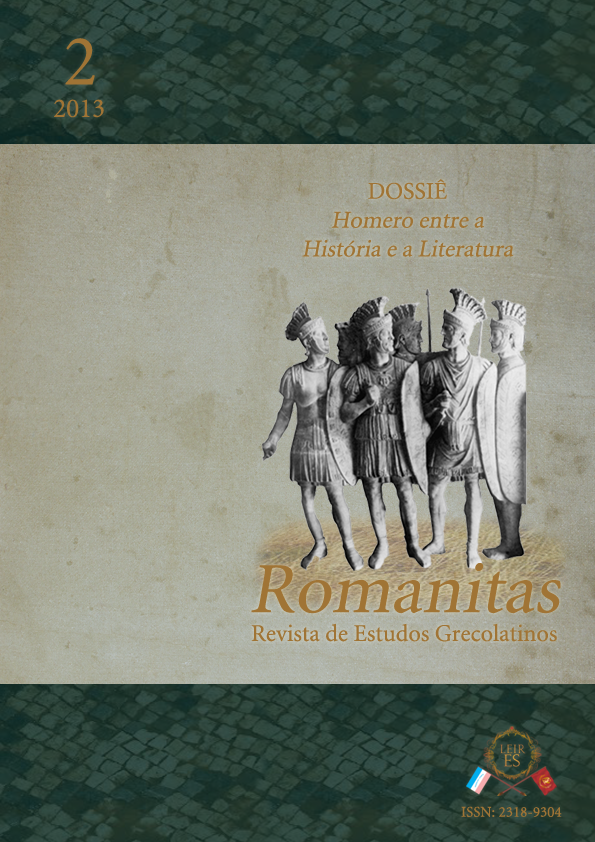Greco-Roman material culture: some reflections on the teaching and research of Classical Archaeology in Brazil
DOI:
https://doi.org/10.17648/rom.v0i2.7418Keywords:
Classical Studies in Brazil, Classical Archaeology, Post-colonial theoryAbstract
In the two last decades Classical Studies have been facing new challenges in Brazil. Although one can find much more opportunities to study Greek and Latin in different public universities spread all over the country what improves local knowledgment on Ancient History, the study of Classical Archaeology remains in second plan. In this context, the aim of this paper is to discuss how Classical History has been taught at some Brazilian universities and to propose some approaches on Classical Archaeology considering post-colonial theory.
Downloads
References
CARLAN, C. U. O Museu Histórico Nacional e as moedas de Constantino I. História Revista (UFG), v. 12, p. 177-403, 2008.
CARLAN, C. U. Poder, imagem e Arqueologia: a iconografia monetária e o exército romano. Revista de História da Arte e Arqueologia, v. 6, p. 7-14, 2007.
CARLAN, C. U. Numismática/Documento/Arqueologia: a cultura material e o ensino da História. Cadernos de história (UFU), v. 1, p. 5-28, 2006a.
CARLAN, C. U. Numismática: “lendo” a moeda como fonte histórica. Um documento alternativo. Revista eletrônica História e História, 2006b.
FEITOSA, L. C. Amor e sexualidade: o masculino e o feminino em grafites de Pompéia. São Paulo: Annablume, 2005.
FUNARI, P. P. A. Brasileiros e romanos: colonialismo, identidades e o papel da cultura material. In: CHEVITARESE, A. L.; CORNELLI, G.; SILVA, M. A. de O. (Org.). Tradição Clássica e o Brasil. Brasília: Fortiu, 2008, p. 179-186.
FUNARI, P. P. A. A renovação da História Antiga. In: KARNAL, L. (Org.) História na sala de aula – conceitos práticas e propostas. São Paulo: Contexto, 2006, p. 95-108.
FUNARI, P. P. A. Class interests in Brazilian archaeology. International Journal of Historical Archaeology 6, 3, p. 209-216, 2002.
FUNARI, P. P. A. Brazilian archaeology, a reappraisal. In: POLITIS, G.; ALBERTI, B. (Ed.). Archaeology in Latin America. London: Routledge, 1999a, p. 17-37.
FUNARI, P. P. A. Algumas contribuições do estudo da cultura material para a discussão da História da colonização da América do Sul. Tempos Históricos, n. 1, p. 11-44, 1999b.
FUNARI, P.P.A. European archaeology and two Brazilian offspring: classical archaeology and art history. Journal of European Archaeology, 5, 2, p. 137-148, 1997.
FUNARI, P. P. A. Rescuing ordinary people’s culture: museums, material culture and education in Brazil. In: STONE, P. G.; MOLINEAUX, B. L. (Ed.). The Presented Past, Heritage, museums and education. London: Routledge, 1994, p. 120-136.
FUNARI, P. P. A. A vida popular na Antiguidade Clássica. São Paulo: Contexto, 1989.
FUNARI, P. P. A. Cultura(s) dominante(s) e cultura(s) subalterna(s) em Pompéia: da vertical da cidade ao horizonte do possível. Revista Brasileira de História, n. 7, v.13, p. 33-48, 1986.
GARRAFFONI, R. S.; FUNARI, P. P. A.; PINTO, R. O estudo da Antiguidade no Brasil: as contribuições das discussões teóricas recentes. In: HINGLEY, R. O Imperialismo Romano: novas perspectivas a partir da Bretanha. São Paulo: Annablume, 2010, p. 09 25.
HINGLEY, R. O Imperialismo Romano: novas perspectivas a partir da Bretanha. São Paulo: Annablume, 2010.
HINGLEY, R. Imagens de Roma: uma perspectiva inglesa. Tradução de Renata Senna Garraffoni e revisão de Pedro Paulo A. Funari. In: FUNARI, P. P. A. (Org.) Repensando o Mundo Antigo. Campinas, IFCH-UNICAMP, Coleção Textos Didáticos n. 47, março de 2002.
HINGLEY, R. (Org.). Images of Rome: perceptions of Ancient Rome in Europe and the United States in the Modern Age. Journal of Roman Archaeology, Supplementary Series 44, 2001.
HINGLEY, R. Roman officers and English gentlemen – the imperial origins of Roman Archaeology. London: Routledge, 2000.
HINGLEY, R. The “legacy” of Rome: the rise, decline and fall of the theory of Romanization. In: WEBSTER, J.; COOPER, N. (Org.). Roman Imperialism: post colonial perspectives. Leicester: University of Leicester Press, 1996, p. 35-48.
HODDER, I. Reading the past – current appoaches to interpretation in Archaeology. Cambridge: CUP, 1999.
HODDER, I. Theory and practice in Archaeology. London: Routledge, 1995.
JONES, S. Historical categories and the praxis of identity: the interpretation of ethnicity in Historical Archaeology. In: FUNARI, P. P. A. et alli (Org.) Historical Archaeology: back from the edge. London: Routledge, 1999, p. 219-232.
JONES, S. The Archaeology of ethnicity: constructing identities in the past and present. London: Routledge, 1997.
LAURENCE, R. The uneasy dialogue between Ancient History and Archaeology. In: Sauer, E.W. (Ed.) Archaeology and ancient history: breaking down the boundaries. London: Routledge, 2004, p. 99-113.
SETTIS, S. The future of the “classical”. Cambridge: Polity Press, 2006.
SHANKS M.; TILLEY, C. Re-constructing Archaeology. Cambridge: Cambridge University Press, 1988.
SHANKS, M.; HODDER, I. Processual, postprocessual and interpretatives archaeologies. In: WHITLEY, D. S. (Org.) Reader in archaeological theory: post processual and cognitive approaches. London: Routledge, 1998, p. 69-94.
TRIGGER, B. G. A History of Archaeology. Cambridge: Cambridge University Press, 1988.
UCKO, P. Archaeological interpretation in a world context. In: UCKO, P. Theory in Archaeology: a world perspective. London: Routledge, 1995, p. 1-27.
WEEDON, C.; JORDAN, G. Cultural Politics: class, gender, race, and the postmodern world. Malden: Blackwell publishers, 1995.
Downloads
Published
How to Cite
Issue
Section
License
Copyright (c) 2014 Romanitas - Revista de Estudos Grecolatinos

This work is licensed under a Creative Commons Attribution-NonCommercial-NoDerivatives 4.0 International License.
a. The authors retain copyright and grant the journal the right to first publication.
b. The authors are authorized to assume additional contracts separately, for non-exclusive distribution of the version of the work published in this journal (e.g., publishing in institutional repository or as a book chapter), with acknowledgment of authorship and initial publication in this journal.
c. Authors are allowed and encouraged to publish and distribute their work online (e.g. in institutional repositories or on their personal page) after the first publication by the journal, with due credit.
d. The journal's texts are licensed under a CC BY 4.0 Deed Attribution 4.0 International Licence (CC BY).




























